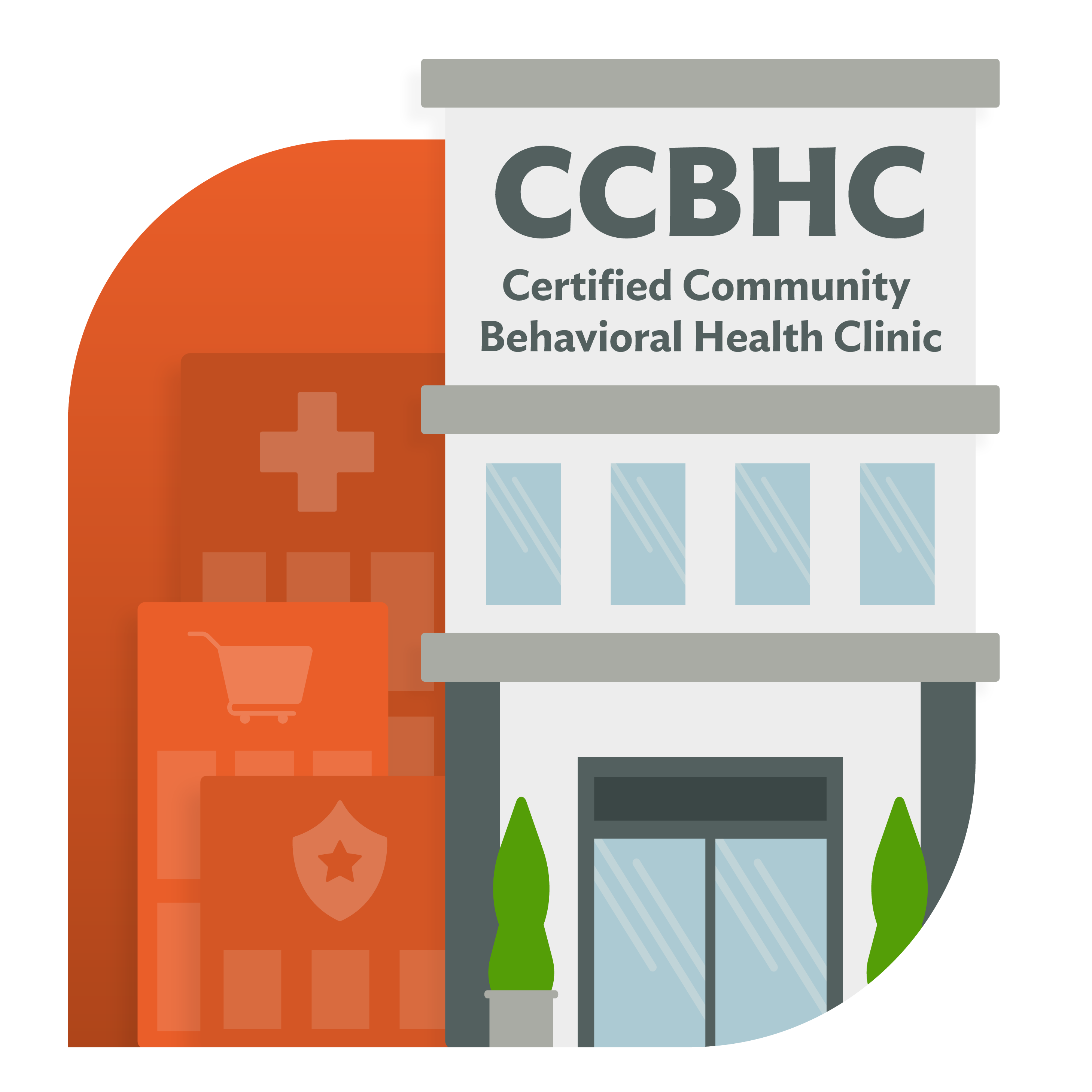What Is a CCBHC?

A Certified Community Behavioral Health Clinic (CCBHC) is a specially-designated clinic that provides a comprehensive range of mental health and substance use services. CCBHCs serve anyone who walks through the door, regardless of their diagnosis and insurance status.
The Excellence in Mental Health and Addiction Treatment Act established a federal definition and criteria for CCBHCs, which receive an enhanced Medicaid reimbursement rate based on their anticipated costs of expanding services to meet the needs of vulnerable populations.
CCBHCs are nonprofit organizations or units of a local government behavioral health authority. They must provide nine types of services, either directly or by contracting with partner organizations, with an emphasis on providing 24-hour crisis care, evidence-based practices, care coordination with local primary care and hospital partners, and integration with physical health care.
This page covers how CCBHCs work, their history and expansion throughout the U.S., their funding models, their impact on communities and patients, and where to find a CCBHC in every state.
How Do CCBHCs Work?
As an integrated and sustainably-financed model for care delivery, CCBHCs:
- Ensure access to integrated, evidence-based substance use disorder and mental health services, including 24/7 crisis response and medication-assisted treatment (MAT).
- Meet stringent criteria regarding timeline of access, quality reporting, staffing and coordination with social services, criminal justice and education systems.
- Receive flexible funding to support the real costs of expanding services to fully meet the need for care in their communities.
CCBHCs have dramatically increased access to mental health and substance use disorder treatment, expanded states’ capacity to address the overdose crisis and established innovative partnerships with law enforcement, schools and hospitals to improve care, reduce recidivism and prevent hospital readmissions.
Data and Impact
CCBHCs dramatically increase access to care, expand state’s capacity to address the overdose crisis, reduce mental health-related hospitalizations, help address the workforce shortage, and create innovative partnerships with law enforcement, schools, and hospitals to improve care.
- CCBHCs are serving an estimated 3 million people nationwide.
- CCBHC status enables clinics to serve 13% more people on average. Medicaid CCBHCs reported a significantly higher average client increase of 33%.
- CCBHCs provide access to mental health and substance use care much faster than the national average wait time of 48 days, with the vast majority offering access within a week or less. They also provide access to certain forms of substance use disorder treatment at vastly higher rates than non-CCBHCs, with 80% of CCBHCs offering one or more forms of medication assisted treatment, compared to only 64% of substance use clinics nationwide.
Check out our Data and Impact section for reports, factsheets and more information on how CCBHCs are expanding access to mental health and substance use care nationwide.
CCBHC Timeline
The CCBHC model was originally implemented in eight states in a 2017 demonstration program through the passage of the Excellence in Mental Health Care Act of 2014, with two states added to the demonstration in 2020. Since 2018, grants from the Substance Abuse and Mental Health Services Administration (SAMHSA) have also funded clinics in dozens of states to take on the activities and services of a CCBHC.
In October 2022, it was announced that the CCBHC model will be expanded nationwide, with planning grants available to help more states with implementation. These grants use funding authorized by the Bipartisan Safer Communities Act.
2014: Excellence in Mental Health Care Act establishes a federal definition and criteria for CCBHCs.
2017: Eight states participate in the original demonstration program.
2018: The Substance Abuse and Mental Health Services Administration (SAMHSA) begins offering CCBHC grants to help states take on the activities and services of a CCBHC.
2020: Two more states are added to the CCBHC demonstration program.
2022: Bipartisan Safer Communities Act extends CCBHC planning grants to additional states.
2024: More than 500 CCBHCs and CCBHC grantees are operating in 46 states, plus the District of Columbia and Puerto Rico.
How Are CCBHCs Funded?
CCBHCs currently are funded through the Medicaid demonstration program or through SAMHSA grants. A growing number of states are moving to implement the model — similar to other value-based or alternative payment models — independently via a state plan amendment or Medicaid waiver. CCBHCs in the Medicaid demonstration are paid using a prospective payment system (PPS), which supports the clinics’ costs of reaching more clients with a wider range of services, while improving their flexibility to deliver client-centered care.
CCBHCs Today
Today, more than 500 Certified Community Behavioral Health Clinics and CCBHC grantees are operating in 46 states, plus the District of Colombia and Puerto Rico.
Please use the following interactive map and list of current CCBHCs by state to learn more about where and how CCBHCs have been implemented nationwide.
Certified Community Behavioral Health Clinics Download
This document provides information on the number and type of Certified Community Behavioral Health Clinics in each state; their counties served; the status of states’ clinic-implementation efforts in Medicaid; and links to any relevant state legislation, appropriations, state plan amendments, or data reports.
Information included here is current and accurate to the best of the National Council’s knowledge. Please contact CCBHC@thenationalcouncil.org with any questions or corrections.
